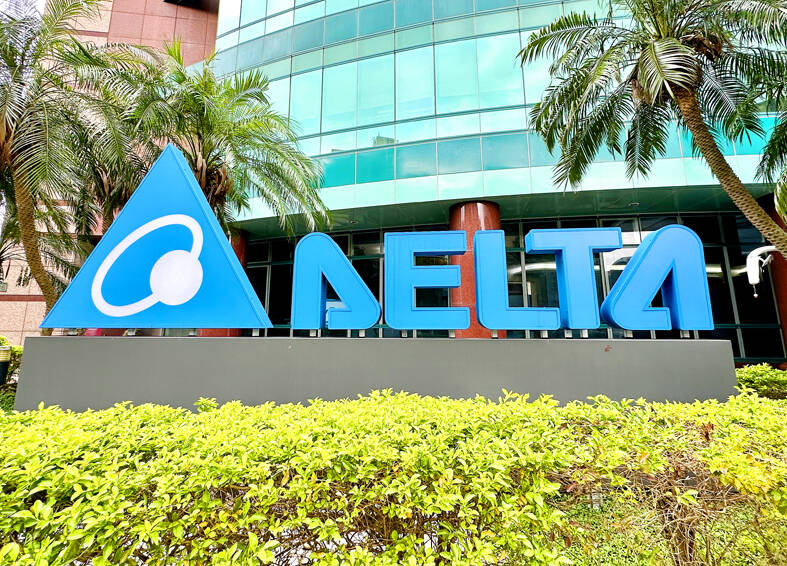Delta Electronics Inc (台達電) has signed an agreement to acquire power inductor and powder materials assets from Alps Alpine Ltd and its subsidiary Alps Electric Korea Co for US$71 million, the company said yesterday. Assets include Alps’ production and research equipment, and patent and intellectual property.
Alps’ powder material technology is used in power inductors that improve the energy efficiency of devices and equipment, so the acquisition would boost the company’s competitiveness in artificial intelligence (AI) servers and electric vehicles, it said.
Delta also said it would integrate Alps Alpine’s power inductor business in Japan and South Korea, combining their research-and-development (R&D) capabilities, production facilities and customer resources to bolster the Taiwanese firm’s passive components business.

Photo: Fang Wei-chieh, Taipei Times
“With this acquisition, we aim to create synergies to ultimately enhance Delta’s patent and supply chain capabilities to help our business development,” Delta chairman and CEO Ping Cheng (鄭平) said in a statement. “By combining our growing R&D capabilities in Japan with Alps, we can accelerate the development of innovative products and technologies.”
The deal comes as the company is gearing up to seek opportunities in the booming data center, AI, high-performance computing, edge computing, electric vehicle and next-generation information and communications technology realms, it said.
Delta told investors earlier this month that AI would be the major growth driver this year, with power supplies used in AI servers making up about 4 to 5 percent of the company’s revenue.

UNCERTAINTY: Innolux activated a stringent supply chain management mechanism, as it did during the COVID-19 pandemic, to ensure optimal inventory levels for customers Flat-panel display makers AUO Corp (友達) and Innolux Corp (群創) yesterday said that about 12 to 20 percent of their display business is at risk of potential US tariffs and that they would relocate production or shipment destinations to mitigate the levies’ effects. US tariffs would have a direct impact of US$200 million on AUO’s revenue, company chairman Paul Peng (彭雙浪) told reporters on the sidelines of the Touch Taiwan trade show in Taipei yesterday. That would make up about 12 percent of the company’s overall revenue. To cope with the tariff uncertainty, AUO plans to allocate its production to manufacturing facilities in

TAKING STOCK: A Taiwanese cookware firm in Vietnam urged customers to assess inventory or place orders early so shipments can reach the US while tariffs are paused Taiwanese businesses in Vietnam are exploring alternatives after the White House imposed a 46 percent import duty on Vietnamese goods, following US President Donald Trump’s announcement of “reciprocal” tariffs on the US’ trading partners. Lo Shih-liang (羅世良), chairman of Brico Industry Co (裕茂工業), a Taiwanese company that manufactures cast iron cookware and stove components in Vietnam, said that more than 40 percent of his business was tied to the US market, describing the constant US policy shifts as an emotional roller coaster. “I work during the day and stay up all night watching the news. I’ve been following US news until 3am

Taiwan will prioritize the development of silicon photonics by taking advantage of its strength in the semiconductor industry to build another shield to protect the local economy, National Development Council (NDC) Minister Paul Liu (劉鏡清) said yesterday. Speaking at a meeting of the legislature’s Economics Committee, Liu said Taiwan already has the artificial intelligence (AI) industry as a shield, after the semiconductor industry, to safeguard the country, and is looking at new unique fields to build more economic shields. While Taiwan will further strengthen its existing shields, over the longer term, the country is determined to focus on such potential segments as

COLLABORATION: Given Taiwan’s key position in global supply chains, the US firm is discussing strategies with local partners and clients to deal with global uncertainties Advanced Micro Devices Inc (AMD) yesterday said it is meeting with local ecosystem partners, including Taiwan Semiconductor Manufacturing Co (TSMC, 台積電), to discuss strategies, including long-term manufacturing, to navigate uncertainties such as US tariffs, as Taiwan occupies an important position in global supply chains. AMD chief executive officer Lisa Su (蘇姿丰) told reporters that Taiwan is an important part of the chip designer’s ecosystem and she is discussing with partners and customers in Taiwan to forge strong collaborations on different areas during this critical period. AMD has just become the first artificial-intelligence (AI) server chip customer of TSMC to utilize its advanced